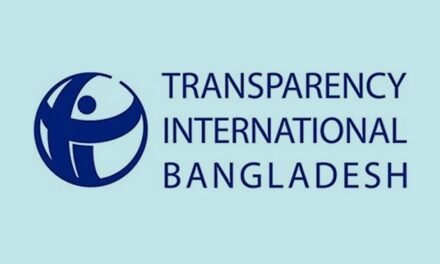The passport, BRTA, law enforcement, judiciary, and land sectors were found to be the most corrupt in the service sector, with 70.9% of Bangladeshi households reported corruption between May 2023 and April 2024. Furthermore, 50.8% of households experienced bribery at this time, with law enforcement, BRTA, and passport services having the highest percentages. TIB revealed these findings at a press conference unveiling the “Corruption in Service Sectors: National Household Survey 2023” results. The survey of 2023 revealed that 70.9% of households in Bangladesh has experienced corruption in some form while availing services from various public and private sectors or institutions. Passport services (86%) were identified as the most corrupt sector, followed by BRTA (85.2%), law enforcement agencies (74.5%), judicial services (62.3%), land services (51%), public healthcare (49.1%), and local government institutions (44.2%). Overall, 50.8% of households reported paying bribes or being forced to pay unauthorized money to access services. The highest incidences of bribery were reported in passport services (74.8%), BRTA (71.9%), law enforcement agencies (58.3%), judicial services (34.1%), land services (32.3%), and local government institutions (29.7%). Among the households that paid bribes, 77.2% cited the reason as “services cannot be obtained without paying a bribe,” highlighting a concerning institutionalization of bribery practices.

Households that paid bribes or unauthorized money for services from May 2023 to April 2024 spent an average of BDT 5,680 each. The total estimated bribes or unauthorized payments across all sectors during this period amounted to BDT 10,902 crore, which is 1.44% of the national budget for 2023-24 and 0.22% of GDP. Analysis of the results from TIB’s household surveys since 2010 shows that from 2009 to April 2024, the included service sectors/institutions have collected an estimated total of BDT 146,252 crore in bribes or unauthorized payments. The survey collected data on corruption and harassment encountered by selected households while obtaining services from service sectors between May 2023 and April 2024. Data for this survey were collected between May 13 and August 3, 2024.
The survey reveals that corruption and bribery disproportionately impact low-income and marginalized groups. Households earning below BDT 24,000 monthly spend 0.93% of their annual income on bribes, while those earning above BDT 85,000 spend only 0.21%. Women, religious minorities, indigenous peoples, and individuals with disabilities face additional burdens, worsening their socioeconomic challenges. Women are notably impacted by corruption in local governance and educational sectors, which hinders them from participating and, in certain instances, obstructs their progress. TIB Executive Director Dr. Iftekharuzzaman said, “We have seen that the much-publicized declaration of “zero tolerance against corruption” remains confined to rhetoric. While the government speaks of combating corruption on paper, reports exposing its prevalence are often dismissed. Institutions tasked with preventing corruption are not only ineffective but have also had their operational scope significantly curtailed. Consequently, due to the failure to control corruption, the general public is held hostage to it and forced to accept it. It is concerning that individuals who have been accused of corruption are being promoted to prominent roles, including the role of presidents of organizations and principal guests at events, including religious institutions. The persistence of this trend serves as evidence that corruption is being institutionalized through impunity, a situation that is concerning to us. Those involved in corruption must be held responsible, reflecting the public’s strongest demand as highlighted in the survey findings. The current context offers a crucial opportunity. If the interim government can set a solid precedent by taking immediate action against corruption, it may provide a benchmark for future governments, compelling them to continue such efforts.”
The survey shows that the rate of victim to corruption is higher when receiving services in person compared to online or mixed methods (partially online and partially in person). Although digital services have been introduced in various sectors, the rates of corruption and bribery in these sectors indicate that, on one hand, digital services are flawed, and on the other hand, digitization has been implemented in a way that compels service recipients to use mixed methods to get services and pay bribes, thereby leaving room for corruption and bribery. Dr. Zaman further said, “The partial digitization of government service delivery has failed to achieve the desired benefits of integrating information technology into the service sector. Service recipients are often compelled to navigate a mixed system, which leaves room for bribery. Many officials demand several bribes, but services are still not rendered, which permits networks of corruption to continue operating unchallenged. These syndicates are still very difficult to break. Also, the Anti-Corruption Commission (ACC) is regarded as ineffective at fighting corruption. The ACC receives only 0.6% of complaints due to a lack of information about the process. Even when complaints are filed, they rarely lead to resolution, often resulting in harassment for the complainant. As a result of this lack of accountability, corruption has been authorized to continue at worrisome levels, which has undermined public trust and contributed to ineffective governance.”
The survey recommends taking legal action against individuals involved in corruption, with active roles for the Anti-Corruption Commission (ACC) and relevant institutions. Full digitization of services and the implementation of ‘one-stop’ service systems are urged to minimize direct interactions and reduce corruption. Institutions should adopt modern codes of conduct, specifying service delivery protocols, timelines, and behavior standards, alongside systems to collect recipient feedback for performance evaluation. Employee promotions and placements should be merit-based, with corruption-accused individuals barred from benefits. Citizen charters must be regularly updated with service fees and timelines, displayed prominently, and supported by active institutional social media platforms. Additionally, gaps in personnel, infrastructure, and logistics must be addressed, with skill-enhancing training programs introduced for employees. The press conference was attended by TIB Executive Director Dr. Iftekharuzzaman, Research & Policy Division Director Muhammad Badiuzzaman, and an expert research team from Dhaka University, including former Professors P.K. Motiur Rahman, Sekander H. Khan, and Muhammad Shuaib. The event was conducted by TIB Outreach & Communication Division Director Mohammad Tauhidul Islam, with TIB Research Fellow Mohammad Nure Alam and Research Associate Mohammad Abdul Hannan Shakhider presenting the findings.



